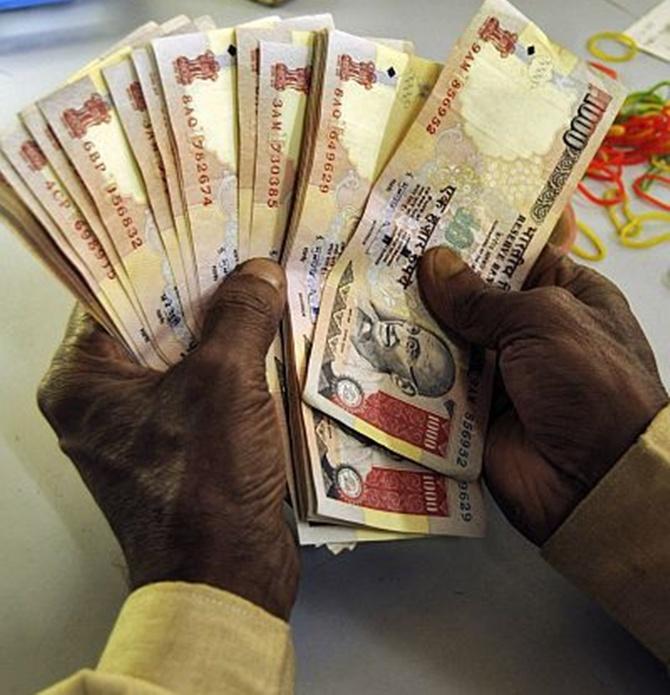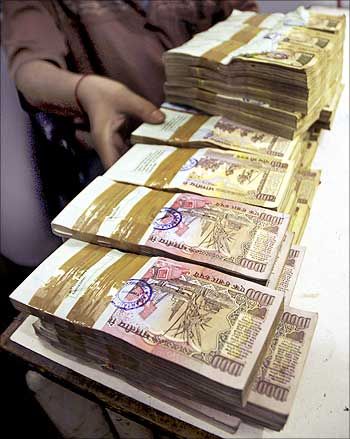
In the first tranche, CBDT to issue letters to those spending Rs 1 crore (Rs 10 million) a year
The Income Tax department has zeroed in on 900,000 high-value spenders and plans to confront them with the database of their transactions, to persuade them to avail the black money window -- Income Disclosure Scheme, 2016 -- that will close on September 30.
In the first tranche, the department will send out letters in 100,000 cases where the money spent is at least Rs 1 crore (Rs 10 million) each a year.
Letters for the remaining cases would be sent in batches.
In the second stage, letters would be issued for cases involving spending above Rs 50 lakh (Rs 5 million).
“A detailed exercise has been carried out and we have prepared a database of 0.9 million (900,000) pieces of information (on cases of high-value and potential unreported cases). . .
"This is one area to tackle tax evasion. We will issue them (taxpayers) letters and confront them that we have information,” Central Board of Direct Taxes Chairman Atulesh Jindal told reporters.
He indicated that the IDS would be voluntary in nature.
“We will certainly like to give them the opportunity to come clean. People should avail this window.
"We want to say that we have this database and we will make them aware about this. The option is with them (to use the IDS or not).”
Although the scheme is voluntary in nature, the issuance of letters during the window might instil fear among the tax evaders to come clean using the one-time scheme and get immunity from prosecution.
“After tackling the 100,000 cases, we will proceed and send out letters for the next lot of identified transactions of Rs 50 lakh and above.
"We are getting information from a lot many sources and we are putting it to use for scrutiny,” an official said.
After the window expires, the rate of penalty for concealment of income under the Income Tax Act is up to 200 per cent and imprisonment.
IDS gives domestic taxpayers the chance to declare undisclosed income or assets by September 30 and avail immunity from higher penalty and prosecution by paying tax and other charges at 45 per cent in three instalments by September 30, 2017.
These include tax rate of 30 per cent, besides Krishi Kalyan Cess and penalty and 7.5 per cent each.
About 25 per cent tax payment needs to be made by November 30, another 25 per cent by March 31 and the remaining 50 per cent by September 30, 2017.
In the previous Budget, the government had come out with a similar compliance window for people holding undisclosed assets abroad.
Disclosures during that window were charged with a total tax and penalty of 60 per cent.
The exchequer received only Rs 2,428.4 crore (Rs 24.28 billion) in payments from disclosures worth Rs 4,147 crore (Rs 41.47 billion) made during a three-month long compliance window that ended on September 30, 2015.
The government has released four sets of frequently asked questions to dispel doubts and clarify about the provisions of the scheme.
The government gets information from various sources on high-value spenders.
It also made it mandatory to furnish PAN for all transactions over Rs 200,000 through all payment modes with effect from January 1, 2016.
It also rationalised monetary limits to furnish Permanent Account Number for certain transactions, doubling it for sale and purchase of immovable property, hotels and restaurant bills to Rs 10 lakh (Rs 1 million) and Rs 50,000, respectively.
Besides, seven third-party sources have to mandatorily report high-value transactions to the tax department.
These include banks that accept cash deposit of Rs 10 lakh and above in a year from any person; bank or a company issuing credit cards where payment against bills exceed Rs 200,000 a year for any person; mutual funds collecting Rs 2 lakh or more for sale of units by any person; companies receiving Rs 500,000 or more against issue of shares, bonds/debentures etc; registrars in respect of sale/purchase of immovable property exceeding Rs 30 lakh (Rs 3 million); and the Reserve Bank of India for remittances exceeding Rs 50 lakh (Rs 5 million).
The image is used for representational purpose only. Photograph: Reuters











